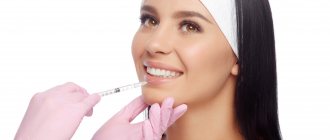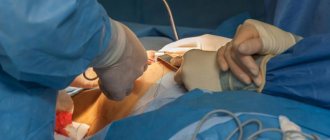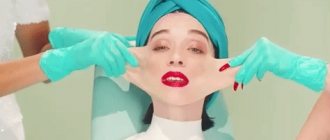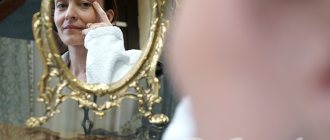Izrailov V.A. We don't do operations that need to be redone.
Let's talk about plastic surgery with V.A. Izrailov, director of the plastic surgery center at the Institute of Beauty on Arbat
— Hello, we are at the Beauty Institute on Arbat and talking with the head of the surgical department, Valery Alexandrovich Izrailov. Valery Alexandrovich, hello, today we would like to talk about what operations are carried out at your beauty institute.
— Good afternoon, you know, before talking about what operations we carry out, I would like to note one important point - to say that our institute is 85 years old. Probably, this figure speaks for itself about how long our institute has existed. And this, probably, also suggests that the work done over the years was done efficiently and well, because the institution can survive for 85 years due to its good work.
— How long have you been working here?
— I have been working at our institute since 1982.
- This is the deadline...
- Maybe. Our institute, our surgical department once began on Semashko Street, not far from the former Voentorg, there is such a small street...... Semashko Street. And there, for the first time in the history of the Soviet Union and Russia, a surgical department for plastic surgery was opened. And this department was headed by our doctor Nadezhda Nikolaevna Gilels. This is the first head of the surgical department in general in the Soviet Union - one hundred percent correct. Since then, this department has continued to exist. This building in which we are located, 4 floors, was previously completely at the disposal of surgeons. It was a hospital - all four floors, to make this clear, all four floors were occupied by wards. We had a queue, there is a very good photograph in this book, now few people remember about it, this is our institute on Kalininsky, former Kalininsky, now on Novy Arbat, so the queue there, those who know and remember, was from passage opposite the Oktyabr cinema - there is an underground passage, do you know? So from this passage to the entrance to the hospital, and this was the outpatient part of our institute, there are three departments: cosmetology, physiotherapy and outpatient surgery... so the queue there was 4 people long from eight in the morning.
Now few people talk about it, few people remember it, but it was a fact. And even when doctors came to work, and there was a line, and they couldn’t get through and asked: “Let me pass, let me come in,” the patients who came to sign up, as it used to be in the store - you didn’t stand there, they started at make us noisy: “Why are you going somewhere without a queue.” This is the number of people in our institute, and this is how many years, even if we take our years, we have been providing assistance. I would like to say that many surgeons worked at our institute who are well known even now. There was such a doctor Khitrov, a Lenin Prize laureate. There are a lot of surgeons who are even now those who have been practicing for a long time, they know and remember these names: Shmelev, Zelenin, Mitkova, Meshchaninov, Bochkareva Marina Petrovna. These are the people who, when I came in 1982, were already working as plastic surgeons in the Soviet Union. You understand, and this is probably clear to everyone, that at that time we could not freely board a plane and fly, say, to Germany and see the operations, who is doing what there. We did it ourselves. We did it according to books. Based on what they could bring and read. Because the basis then was maxillofacial surgery, they graduated from dental institutes.
— That is, the exchange of experience was more bookish than practical...
- Of course of course. There's nothing even to discuss here. This was after the road was opened, and those who once came and left told all of us surgeons: “If you brought here now the instruments and equipment that are there, then you would have nothing to do there.” I want it to be clear that it is not that we rise to the skies, but that it is objective: that we worked both then and now, even more so, and everyone who is seriously involved in plastic surgery can work well. And so we work. If we look in detail at what we do... probably due to the fact that there are now many beauty institutes, competition is growing, it is impossible to ban it.
— Do you somehow feel this competition, do you somehow suffer from it, or do you still understand that your institute is very popular even now?
- We feel that he is still popular. When young patients come and they say that my mother, aunt, and grandmother are here and were treated at your institute. This means that we are remembered, we exist, we work. When we were on Kalininsky, there was a big sign there, everyone saw it, who passed and drove by. And here, in the quiet streets of Arbat... it happens that someone cannot find it, this is life, everything happens and of course, it is felt that new medical institutions have appeared. And yet, you know, it’s always nice, so on Thursday I had a patient whom I operated on 15 years ago. Exactly in 2000. After 15 years, she didn’t go anywhere, she came to our institute. It is clear that she was 15 years old and the same age now, but she felt that she felt good after this operation. Her life and appearance brought pleasure. Therefore, we have maintained continuity of patients. And doctors value their patients.
— Valery Alexandrovich, if we talk about specific operations, what do patients most often come with?
— Most often, women come for face and neck plastic surgery, upper and lower eyelid plastic surgery, breast plastic surgery, liposuction, especially closer to spring, because everyone wants to have a slim figure. Rhinoplasty, a lot of children have ear plastic surgery in the summer or before school. You know, someone starts teasing someone, children... - Well, this is probably more in adolescence? “Let’s put it this way, all ages make ears.” Some people want to wear an open hairstyle. You know, they come, you think that this young girl has come, and then she lifts her hair and it becomes clear.
— Valery Alexandrovich, do you often dissuade patients from surgery? - You know, oddly enough, we dissuade a lot. And in this, perhaps, lies our not just a plus, but a big plus.
- Why are you dissuading me?
- Because people who come for such operations have the idea that they came to us - we led them like this and that's it. The thing is, when you say plastic surgery, it sounds. But this is plastic, and you take the word – surgery. This is an operation. This is post-operative swelling, complications, scarring, healing, it’s a lot of things. This is surgery, this is surgery. Therefore, when people come to you and you start talking to them, you try to understand - this is your task, and whether they really need this person. After all, after 45 years, let’s take this example: face and neck plastic surgery can be done for everyone. But there are moments when you look and realize that it’s still too early.
— Is this determined intuitively?
- This is an experience. Some come and say that they want a normal, good nose. Well, what does it mean to have a normal nose, you have a gorgeous nose. And you have to scrupulously explain everything to the person. It is very important. Due to the fact that there are a lot of things now, you came here, and someone went nearby - the beauty institute and there they told him: no problem. Now, indeed, there are no problems, but they will come later.
— What percentage of patients whom you dissuaded can you tell?
- I never set myself such a goal as a doctor who receives, I know for sure that we all work here according to this system. We do not take patients for surgery just to operate or because they come and say that they have money, the rest does not concern you. You have money - well done, but I can’t. Consider this the doctor you have found. Because you understand that there will be problems later, but they are not needed, the most important thing is for the patient.
— Do you dissuade when you understand that the patient has no specific intention?
“It makes no sense for us to dissuade a patient who wants to undergo surgery, and you know that there will be a benefit.”
- That is, you don’t see the problem, but he does, and you dissuade him.
- Certainly. Another thing, sometimes it happens differently. A man comes and says: I want to do eyelids.
— Blepharoplasty?
- Yes, blepharoplasty. You are talking, the person paid the money. You tell her everything. I see a face and I can say: you could make a face, because I see that there is evidence here. Because you can’t just say, for example, a patient came to get his nose done, and I’ll say: let’s get his ears done - this is crazy.
— That is, it happens that you give advice even if the patient does not talk about it.
- Did not think. Here she comes, but in order for a person to understand this, we have mirrors, the person sits down and you explain everything to this person, show him, tell him how the scar is formed, what the result is. And then, it happens, when you make a face with eyelids, the patient comes and says thank you.
“Does it happen that a patient who was determined refuses and says: oh, I didn’t expect everything to be so difficult?”
- Everything is very simple. Here comes a husband and wife. Appointment. And they say: we (she wants) want breast surgery. And when a girl shows you her breasts, you see, and you begin to explain, not just tell, but you take a felt-tip pen and, like we prepare before an operation, make markings, draw directly on it. Your husband is sitting here, she is standing here, and you say: after the operation, your scar will be here, here. They say: thank you very much, we're off.
- And you don’t persuade?
- It is forbidden. You can't persuade anyone. When I persuade a person to do something that he is not yet ready for, the consequences can be very unpleasant. Why? Because I told you, persuaded you, did it, and I think that everything was done normally: there is an effect, a sense. That's what I think, I'm a doctor. And you look at yourself and say: no, doctor, this is not so and this is not what it is. And why, but because you were not ready, I forced you to do it. And it happens when you come and say: I want to do eyelids. We don't take anything else. I’m doing your eyelids, we removed the stitches, I look and see: just a little bit, maybe a millimeter… And she looks and says: I adore you, doctor. It's because she was ready. This is a very fine line when a person wants it, and you force him. In that example, about the eyelids and face. If you wanted and insisted, then you must make sure that later, even during a masterly operation, the patient does not have any questions, and this is already difficult.
— And if questions arise, is it possible to redo it?
- Well, nothing, there are photographs. You understand, we do not perform operations that would need to be redone. We don't do that. Eyelids, no matter how you operate, you do well. This is pure psychology. I always tell patients: I listen to you, whatever you want, and then I’ll look and say, I can do this, I can’t do this, and you don’t need this. This is how these issues are resolved.
— Valery Alexandrovich, you said that you have been working here since 1982. Apparently, you really like your job?
- Very.
— What exactly do you like most about your work, in surgical and human terms?
- Firstly, it gives pleasure, and this happens in 99.9 cases, to see how pleasant it is for a person. A woman came yesterday, she will have surgery with me on Monday, 15 years have passed. She came to me. We have a lot of doctors who have been working for a long time, but I am pleased that this person came to me. Given today's picture of the presence of beauty institutions, advertising, and all sorts of other attributes of beauty, this is pleasant. It’s nice when you did it, here’s a simple example, a girl has a nagging scar on her arm. The arm does not straighten, but you make it become normal, it’s nice.
— And according to the degree of complexity, you can distinguish operations: what is the easiest, what is the most difficult?
— To say that this is an easy operation and this is a difficult one is impossible, it would be a little wrong. I believe that, let’s say figuratively, a difficult operation means scars. Because scars are different. Varying degrees of occurrence: chemical, thermal, traumatic. It happens that young girls come, 18-20 years old, whom their mother scalded with boiling water when they were children. Well, life happened. And that’s what happens, she grows, and one mammary gland develops normally, but the second does not rise, its scar pulls. And we have to solve this problem, to make sure that it doesn’t drag, so that the breasts develop normally. There are things when you have to, for example, I had a patient, an adult man, we were like friends, at his home his beloved shepherd dog walked across his face with his paw and turned out his entire eyelid. So I operated on the poor little thing three or four times. Slowly, step by step, he also had a concomitant disease - diabetes. They did it step by step so that the eyelid closed.
— Face and neck plastic surgery, at what age would it be recommended for women?
“When I came to work here, I was just starting, I sat at appointments with doctors, listened, studied. So, when girls of 38-40 years old came at that age, they were sent away and were not accepted. There will be no effect, come after 45 years.
- Quite a logical approach.
- That's right, well done, I also agreed then. But now, sitting at the reception now, at my current age, I sometimes operate even at 28-30 years old. Because there is evidence. Because this is life: cigarettes, beer, ecology, life itself. Everything has changed a lot. This is before my eyes. So I’m telling you, when I came, I sat on the sidelines, studied, absorbed, and now I’m sitting in my place, 32 years later, everything has changed. Very much.
— So, the environment has such a strong influence?
- I’m not an ecologist, I can’t argue with anyone, prove something, I don’t intend to. But the fact itself is so.
— That is, the number of women applying has increased, have they become younger? This seems like something extraordinary.
- It doesn’t seem like it anymore. This may seem like it to you, a person who thinks, so what, at 30 years old. In all my conversations, I make sure to tell everyone, the first, most important thing that should be is testimony. That's why I'm saying this now. I started our conversation with the words: plastic surgery. How does this sound. But – surgery. But any operation, you can’t just give a person appendicitis. Nobody will understand you. I can't wrap my head around this. There are indications for appendicitis, symptoms that tell the doctor that it is appendicitis. So it is with us.
- Okay, can we talk more specifically? What indications are there for plastic surgery of the face and neck, for example, for a 30-year-old girl?
- This is excess skin, this is a drooping oval, these are pronounced nasolabial folds, this is a drooping corner of the mouth, this is excess skin of the neck. These are, again, I repeat, the directions along which we determine. It is not necessary that we compete at 30 years old. It’s just that the time has changed, and the readings have shifted. Don’t take my words to mean that as of yesterday we are operating on all 30-year-olds. You asked about age. I gave you an example of what was and what has become. The age when we took on everyone was 45 years old and above, now there are younger people whom we take on.
— Do you advise, give any advice to avoid plastic surgery? In general, can a plastic surgeon give such advice?
- You see what’s the matter. We have three dermatology departments, physiotherapy and laser. Doesn't mean the person needs to go under the knife right away. Nowadays there are many types of minimally invasive operations; it is not necessary to undergo surgery.
— Can you name an operation that is close to surgical intervention, which can help avoid or delay?
- These are threads.
- Golden threads.
- Well, there are a lot of them. Let's say - not gold, but just threads. It's enough. There are patients who come and say: I did threads, it didn’t help me. Apparently, she made these threads when there was excess skin, the condition of the skin was already such that the threads could not hold this frame. But they persuaded her and promised her that everything would be great. This is an unprofessional approach, wrong, just to make money. But after a while she sees that there is no point. When they come to us, there is such a moment, you say that this is how we do it, tell you, remove it, raise it, and then I advise you the same threads, mesotherapy, Botex. Because this also works. This improves the effect, lengthens the time in which you live and enjoy.
- But the operation is inevitable?
- According to testimony.
— What are your capabilities now, the capabilities of your institute? What operations are you currently performing?
- Today we have three operating rooms on the 4th floor, five tables, one small operating room - we partially do outpatient surgeries and dermabrasion there. We have a hospital with 15 beds. We have 8 surgeons, an anesthesiologist, 3 operating room nurses, a senior operating room nurse, and an anesthetist working in our department. We are provided with everything in full, now we have been working for a year with a new body-jet device for liposuction. Now, if someone comes, he does both liposuction and lipofilling. Our institute performs almost all operations that exist today. I don’t only take some bone ones, big ones, that’s not our profile. And so, plastic surgery of the mammary glands - enlargement and reduction, plastic surgery of the abdomen, plastic surgery of the ears, plastic surgery of the nose, plastic surgery of the upper and lower eyelids, forehead, if anyone is interested in this. Plastic surgery of the face and neck – circular plastic surgery. Sometimes we just say: face. Lots of dermabrasion. I have to say, I think this is important. They used to say that these operations were only for women. Today this cannot be said. Now, let's say, about 10 years. There are many people who do face, eyelids, and liposuction. People want to work, for some it is related to work, there are many young people, others just want to take care of themselves. There are more men, this can be seen in private hospitals; if you go through, you will see that the presence of men is also quite large.
— Are there any operations that are performed only by you?
- No, to be honest, I find it difficult to tell you.
— That is, you have a wide range of operations.
“Again, we'll go back to the way things were.” Now everything is open. Now everything is there, you know? Someone goes on vacation to Germany. He goes to the clinic and stands and looks.
— What would you call your competitive advantage over other clinics?
“I’m sure that we have this message: talk to the patient, take your time, explain, don’t take everything that comes to you. It is very important. People who experience this understand it. You know, 80 percent of the operation comes later. The patient's joy and the doctor's peace of mind. Until you discuss everything, and it happens that you miss something, you start talking, get carried away, and you are captivated. You see that the person understands and accepts you, but something may disappear.
— That is, the uniqueness of your beauty institute is in the human factor?
- Yes. We were taught this way - not to rush, not to get too excited, and now I am also teaching young guys. I think, and further, I hope that our institute will exist forever, and they will pass it on in the same way.
— Thank you, Valery Alexandrovich.
Be the first to watch new videos!
Subscribe! plastic surgery
Izrailov Roman Evgenievich
Education:
- 1993 – 1999 – Full-time student at Moscow State Medical and Dental University. Diploma with honors.
- 1999 – 2001 – Clinical residency in surgery at Moscow State Medical and Dental University.
- 2001 – 2003 — Full-time postgraduate study, Department of Faculty Surgery No. 2, MSMSU (early defense of the dissertation).
Internships:
- 1999 - Department of General Surgery and Oncology, Dusseldorf University, Germany.
- 2013 - Mayo Clinic, Rochester, USA.
- 2013 – Institute Mutualiste Montsouris, Paris, France.
- 2014 - Seoul National University Bundang Hospital, Seoul, Korea.
Professional skills:
A wide range of surgical interventions on the organs of the chest, abdominal cavity and retroperitoneal space for various urgent and planned surgical pathologies, most of which are performed in a minimally invasive manner (laparoscopic, thoracoscopic and under ultrasound and X-ray television control). A special topic of scientific and practical interest is the use of minimally invasive technologies in the treatment of patients with malignant and benign diseases of the gastrointestinal tract.
Own experience in performing operations:
- Operations on the esophagus
- Thoraco-laparoscopic extirpation of the esophagus with simultaneous plastic surgery of the gastric tube or colon, minimally invasive removal of esophageal diverticula, thoracolaparoscopic removal of benign formations of the esophagus (leiomyomas, cysts, fibromas, etc.), Laparoscopic cardiomyotomy for achalasia cardia (Geller operation). Stenting, bougienage and ballooning of benign and malignant esophageal strictures.
- Surgeries on the stomach and duodenum
- Laparoscopic distal, proximal and total resection of the stomach for tumors and ulcerative diseases, including gastrectomy with simultaneous transhiatal resection of the esophagus for cancer of the gastroesophageal junction.
- Laparoscopic fundoplication (gastroesophageal reflux disease, hiatal hernia).
- Laparoscopic resection of the duodenum, pyloroplasty.
- Surgeries on the pancreas
- Laparoscopic pancreatoduodenectomy (Whipple operation), laparoscopic distal pancreatectomy, laparoscopic economical resection of the head of the pancreas (Frey's operation), subtotal resection of the head of the pancreas (Beger's operation), laparoscopic longitudinal pancreatoenterostomy (Pyustov, Partington operation), laparoscopic pancreatocystojejunostomy, laparoscopic total pancreatectomy.
- Experience in laparoscopic (endovideosurgical) and percutaneous interventions under ultrasound control for purulent-necrotic lesions of the pancreas (pancreatitis, pancreatic necrosis).
- Operations on the liver and extrahepatic bile ducts.
- Laparoscopic right and left hemihepatectomy, other anatomical and non-anatomical liver resections. Laparoscopic resection of extrahepatic bile ducts for malignant neoplasms and benign strictures. Laparoscopic removal of stones from extrahepatic and intrahepatic bile ducts. Cholecystectomy. Laparoscopic formation of bypass anastomoses in case of impaired passage of food and obstructive jaundice in patients with unresectable tumors of the biliopancreatoduodenal organs.
- Operations on the colon and rectum.
- The entire scope of resective interventions, including total coloproctectomy for tumor and benign (complicated ulcerative colitis, Crohn's disease, etc.) lesions, is performed laparoscopically.
- Own experience in performing non-vascular interventional interventions for obstructive jaundice (external, external-internal drainage, stenting of bile duct strictures).
- Stenting of tumor strictures of the gastrointestinal tract due to obstruction of the esophagus, duodenum, and colon. Drainage of isolated fluid accumulations of the abdominal cavity under ultrasound control (abscesses).
- Ultrasound-guided biopsies of abdominal tumor formations.
- Experience in open and laparoscopic operations for emergency surgical pathologies: appendectomy, cholecystectomy, suturing of perforated gastric and duodenal ulcers, splenectomy, etc.
- Experience in performing various types of plastic surgery for hernias.
Scientific activity:
- 2003 — Dissertation for the degree of Candidate of Medical Sciences on the topic: “Immunotherapy with Galavit in complex postoperative treatment of patients with common forms of peritonitis”;
- 2012 — Dissertation for the degree of Doctor of Medical Sciences on the topic: “Minimally invasive technologies in the treatment of patients with malignant neoplasms of the organs of the upper respiratory tract.”
Experience:
- 2013 - present - Head of the Department of Innovative Surgery at the Moscow Scientific Research Center.
- 2013 - present - Professor, Department of Faculty Surgery No. 2, Moscow State Medical University.
- 2007 - 2013 - Associate Professor, Department of Faculty Surgery No. 2, Moscow State Medical University.
- 2003 - 2013 - Responsible surgeon of a multidisciplinary hospital (City Clinical Hospital No. 68).
- 2003 - 2007 - Assistant, Department of Faculty Surgery No. 2, Moscow State Medical University.
Specialization:
- Surgery, Ultrasound diagnostics, Oncology.
- Participation in the pedagogical process, including at the Faculty of Postgraduate Education of the department. During his work, he became the author of 61 scientific papers published in Russia and abroad. He is a co-author of a guide on the use of ultrasound in the diagnosis and treatment of patients with acute appendicitis and a monograph on the treatment of patients with obstructive jaundice.
- Currently, the area of scientific and practical interest is the study of the role of minimally invasive technologies in the treatment of patients with malignant neoplasms of the gastrointestinal tract.
E-mail address:











